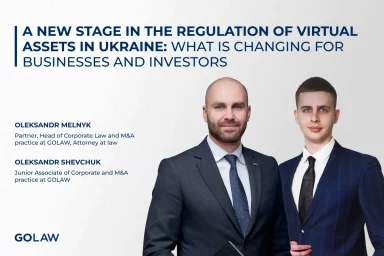Legal side of M&A in the Ukrainian energy sector: stages, risks and key aspects
General stages
Given the complexity of M&A transactions in the energy sector, legal support should cover all key stages: from structuring the transaction to its integration and protecting the interests of the parties.
Structuring involves determining the optimal form of the transaction: the purchase of shares or assets, merger or accession, taking into account legal, tax, financial and regulatory aspects. The main goal at this stage is to minimise risks and ensure the achievement of the strategic goals of the parties.
Financial structuring includes analysis of sources of financing (own funds, credit resources, attracted investments) and preparation of relevant documentation, in particular credit agreements, pledge agreements, suretyships, and bank guarantees.
Tax structuring involves developing an efficient tax model in compliance with domestic laws and international standards, aimed at minimising tax liabilities and avoiding adverse fiscal risks for the parties.
Where appropriate, a special purpose vehicle (SPV) is incorporated to execute the transaction. This approach may isolate risks, streamline financing, and optimise the tax burden. At this stage, legal support includes SPV incorporation, drafting and negotiating constitutional documents, ownership structure, etc.
Legal counsel facilitates negotiations between the parties, protecting the client’s interests and securing favourable terms, particularly with regard to financing, guarantees and warranties, asset transfer, and risk allocation. Typically, the negotiation process begins with the signing of a Letter of Intent or Term Sheet between the parties, which defines the main terms of the potential transaction and the steps to be taken by each of the parties in preparation for the sale.
A fundamental stage of the process is legal due diligence, a comprehensive review of the target’s legal standing, encumbrances, ongoing litigation, licensing, land, environmental and technical risks, among others. The findings of the due diligence are critical for the final decision on the transaction.
In parallel, pre-sale restructuring may take place — optimisation of the corporate structure, debt restructuring, spin-offs or business consolidations, dispute resolution, and other risk mitigation measures — all aimed at enhancing the attractiveness of the target.
Taking into account the chosen structure and the results of the legal due diligence, an appropriate package of legal documentation is prepared, including sale and purchase agreements, shareholders agreements, security agreements, as well as supporting documents. The accuracy of the documentation and its legal “cleanliness” are crucial for the safety of the transaction.
Regulatory interaction includes obtaining merger clearance from the Antimonopoly Committee, licenses for relevant activities, grid connection specifications, construction permits, and other approvals. Due to sector-specific regulatory requirements, engagement with state authorities is often decisive for a successful deal.
The final stage is the execution of the transaction — signing of all documents based on agreed commercial, legal and financial terms, and completion of pre-closing obligations (closing).
In case of disputes or conflicts arising post-closing, the legal team ensures protection of the client’s interests, provides legal support in negotiations, represents the client in court proceedings, and implements measures to minimise potential losses.
Key risks
The process of concluding M&A transactions in the energy sector involves a number of risks that can significantly affect the success and implementation of the deal. One of the key challenges is strategic risk, which arises from misaligned deal objectives or the lack of a clear vision for future integration. Parties often overestimate the potential value of the business without having a realistic plan for merging operational activities, which complicates the realization of expected synergies after the transaction is closed.
Regulatory risk poses a major threat. The energy sector is one of the most highly regulated industries; legislative changes, licensing complexity, or misinterpretation of regulatory requirements may delay or even block the transaction. Breaches of licensing, antitrust or environmental rules may result in administrative penalties and reputational damage.
Financial risks are also critical. Inaccurate valuation of assets and obligations may lead to substantial losses. Often, after the conclusion of the transaction, previously unaccounted debts or infrastructure modernisation costs are revealed, which increases the total cost of investment and changes the financial model of the project. In addition, in order to successfully raise financing, the project must demonstrate the ability in the long term to generate a stable income sufficient to cover both operating expenses and loan servicing.
Tax risks are a serious concern. Given the complexity and variability of tax laws, inefficient structuring of M&A transactions may cause significant tax obligations or claims from regulatory authorities. In the case of cross-border agreements, tax problems may increase due to the lack of harmonization of tax regimes of different jurisdictions.
Environmental and technical risks form a separate category, especially regarding compliance with Environmental Impact Assessment (EIA) procedures. Energy projects — such as construction or refurbishment of power plants, oil and gas pipelines — may require EIA processing. Non-compliance may result in construction permit revocation, project suspension, or even administrative or criminal liability.
Title risks regarding real estate and land use are also critical. Violations in land acquisition or zoning regulations may lead to loss of ownership or use rights, making project implementation impossible.
Lastly, organisational risk cannot be overlooked. Lack of transparent ownership, shareholder conflicts, or flawed corporate governance may not only hinder deal execution but also endanger post-deal operations.
Additional Considerations
Legal support for energy M&A goes beyond classic stages such as structuring, due diligence, and contract drafting. Sector specifics require thorough analysis of additional aspects critical to post-deal integration, governance, and asset value preservation.
One such aspect is intellectual property. In modern energy business — especially renewables, digital solutions, and smart grid technologies — IP rights are vital. Legal audit of patents, trademarks, proprietary technology, licence agreements, and know-how helps identify potential risks of IP loss or infringement. Proper IP transfer arrangements, confidentiality safeguards, and protection against information leakage are indispensable.
Cybersecurity has also become an issue. With growing reliance on digital infrastructure, cyberattacks, data breaches, or IT failures may cause severe disruption. Legal due diligence should include an IT infrastructure audit and compliance with data protection laws (e.g., GDPR or local regulations).
Amid today’s challenges, political and social risks demand special attention. Government policies, tariff regulation, access to state support — or conversely, new restrictions — may determine the transaction’s viability. Under martial law, where regulation evolves rapidly, long-term projections are highly uncertain. Accounting for these factors during structuring and evaluation helps adapt the deal model and improve resilience.
Conclusions
Legal support in energy M&A extends far beyond conventional legal tasks. It spans economic, technical, regulatory, and organisational domains, requiring deep cross-disciplinary expertise and strategic insight. This comprehensive approach not only mitigates risks but also delivers real added value for all parties involved.
An inside look is always more valuable. If you want to get a deeper insight into the current state of the energy market, understand where the industry is heading, and what opportunities are opening up for investors today, we recommend listening to the GOLAW podcast. In it, the firm’s partners share real-life cases, insights and practical business advice.

Oleksandr Melnyk
Partner, Head of Corporate Law and M&A practice, Attorney at law
- Contacts
- 31/33 Kniaziv Ostrozkykh St, Zorianyi Business Center, Kyiv, Ukraine, 01010
- o.melnyk@golaw.ua
- +38 044 581 1220
- Recognitions
- The Legal 500 2024
- IFLR1000 2024 (International Financial Law Review)
- Legal 500 Green Guide 2024
- TOP-50 Law Firms of Ukraine Ranking | YURPRAKTYKA
Get in touch
To get a consultation, please fill out the form below or call us right away:Sign up to be aware
New achievements are inspired by information. GO further, don’t miss out GOLAW news and legal alerts
Our expertise
-
- Energy and Natural Resources
- Antitrust and Competition
- Banking and Finance
- Compliance, Corporate Governance and Risk Management
- Corporate and M&A
- Criminal and White Collar Defence
- Defense in Anti-corruption procedures and regulations
- Labor and Employment
- Natural Resources and Environment
- Government Relations (GR)
- Insolvency and Corporate Recovery
- Intellectual property
- International trade
- Legal support of business and private Сlients in Germany
- Litigation and dispute resolution
- Private clients
- Real Estate and Construction
- Restructuring, Claims and Recoveries
- Martial Law
- Tax and Customs
-
- Agribusiness
- Aviation
- Chemical industry
- Engineering, Construction and Building Materials
- Natural Resources and Environment
- Financial institutions
- IT and AI
- Industry and manufacturing
- Healthcare industries, Life sciences and Pharmaceuticals
- Media, Entertainment, Sports and Gambling
- Retail, FMCG and E-Commerce
- Transport and Logistics
We use cookies to improve performance of our website and your user experience.
Cookies policy
Cookies settings







